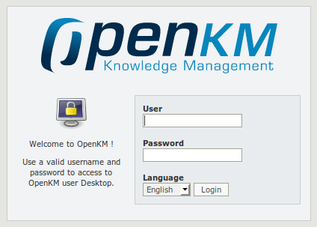Difference between revisions of "Test OpenKM installation"
m |
|||
| (4 intermediate revisions by 2 users not shown) | |||
| Line 8: | Line 8: | ||
[[File:Okm_user_guide_001.jpeg|317px|center]] | [[File:Okm_user_guide_001.jpeg|317px|center]] | ||
| − | + | ||
| + | You can log into OpenKM with '''okmAdmin''' user (default password is '''admin'''). If you want OpenKM to be accessible from others computers in your network, try modify $TOMCAT_HOME/conf/server.xml | ||
<source lang="xml"> | <source lang="xml"> | ||
| − | <Connector address=" | + | <Connector address="0.0.0.0" connectionTimeout="20000" port="8080" protocol="HTTP/1.1" redirectPort="8443"/> |
</source> | </source> | ||
| + | $ ./bin/catalina.sh start | ||
| − | + | Tomcat will bind to all network interfaces of the computer. Now OpenKM can be accessed from another computer using http://your-domain.com:8080/OpenKM. | |
| − | |||
| − | |||
| − | |||
| − | |||
| − | {{Warning|Don't close the terminal or | + | {{Warning|Don't close the terminal or Tomcat will shutdown and OpenKM application will stop.}} |
| − | If you have configured | + | If you have configured Tomcat service in your Debian / Ubuntu box, you can launch it this way: |
| − | $ /etc/init.d/ | + | $ /etc/init.d/tomcat start |
You can watch the server log to see OpenKM messages. | You can watch the server log to see OpenKM messages. | ||
$ tail -f $TOMCAT_HOME/logs/catalina.log | $ tail -f $TOMCAT_HOME/logs/catalina.log | ||
| − | |||
| − | |||
[[Category: Installation Guide]] | [[Category: Installation Guide]] | ||
Latest revision as of 18:51, 1 December 2012
Once you have configured OpenKM and Tomcat you can start them. You can run Tomcat from the command line from the $TOMCAT_HOME folder:
$ ./bin/catalina.sh start
This command will launch Tomcat and start the OpenKM application. By default Tomcat only listens on localhost, so OpenKM will only be accessible from http://localhost:8080/OpenKM. You will see a login screen like this:
You can log into OpenKM with okmAdmin user (default password is admin). If you want OpenKM to be accessible from others computers in your network, try modify $TOMCAT_HOME/conf/server.xml
<Connector address="0.0.0.0" connectionTimeout="20000" port="8080" protocol="HTTP/1.1" redirectPort="8443"/>
$ ./bin/catalina.sh start
Tomcat will bind to all network interfaces of the computer. Now OpenKM can be accessed from another computer using http://your-domain.com:8080/OpenKM.
| Don't close the terminal or Tomcat will shutdown and OpenKM application will stop. |
If you have configured Tomcat service in your Debian / Ubuntu box, you can launch it this way:
$ /etc/init.d/tomcat start
You can watch the server log to see OpenKM messages.
$ tail -f $TOMCAT_HOME/logs/catalina.log
